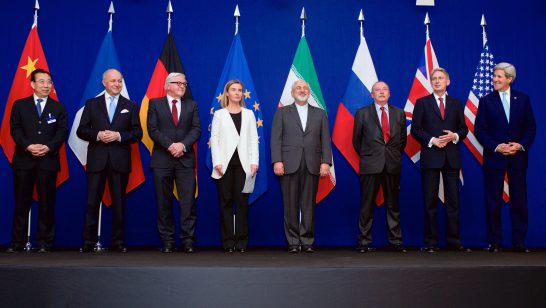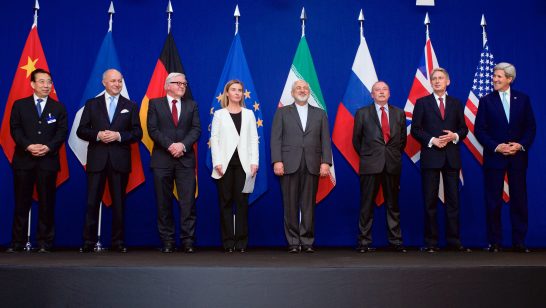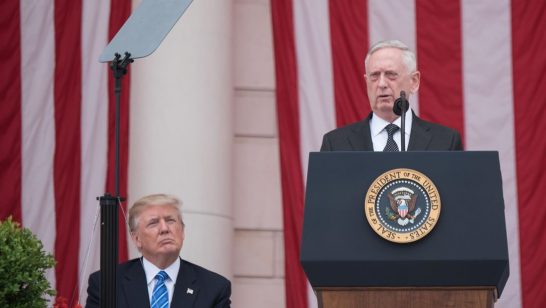
The US president has spoken. In a hostile statement reminiscent of George W. Bush’s “Axis of Evil” speech president Trump has refused to certify the Iran nuclear deal, the JCPOA. The deal will now go to Congress who have until December 14th to decide whether or not to re-impose sanctions, lifted after the JCPOA’s implementation. This may not happen immediately as the president proposed certain US-defined triggers, most of which are outside the provisions of the deal. Consequently, the US will not exit the deal, at least not now, but will increase its pressure on Iran, including by sanctioning the Islamic Revolutionary Guard Core (IRGC), Iran’s powerful military and security organisation. In addition to rebuking to Iran, the president’s speech could also be interpreted as a way to pressure the deal’s other signatories (China, France, Germany, Russia, the UK and the EU) to renegotiating and “fixing” what president Trump perceived was wrong with the deal.
The leaders of the three European signatories, France, Germany and the UK, who have had longstanding negotiations with Iran, were quick to respond. Together Macron, May and Merkel stated: “We stand committed to the JCPOA and its full implementation by all sides. Preserving the JCPOA is in our shared national security interest”. They called on the US to consider the implications to the security of the US and its allies before re-imposing sanctions. While the Europeans have objected to any renegotiation of the deal, the leaders expressed willingness to address, together with the US, issues outside the JCPOA, such as Iran’s ballistic missile program and its regional activities.
Even if sanctions are not immediately introduced and the JCPOA doesn’t unravel straight away, two key players, the EU and the US, are on the opposing sides of the dispute. The uncertainty surrounding the JCPOA has damaged transatlantic relations and harmed collective security. It has also badly undermined the efficacy and credibility of nuclear diplomacy and nuclear multilateralism. If Iran is complying with the terms of the nuclear agreement but the US decides not to confirm it, why should North Korea sign up to a similar diplomatic agreement constraining its own nuclear capabilities, knowing that the US might renege at any time? When the possibility of a nuclear war is no longer distant and unimaginable, ending an accord which enhances non-proliferation is not a trivial loss to global security. Moreover focusing on the “sunset” clauses of the deal and claiming that Iran will restart its nuclear program after these expire, distorts what the JCPOA was realistically able to achieve. Iran is a non-nuclear state under the terms of the Nuclear Non-Proliferation Treaty and will continue to be so after the JCPOA ends. If this is not enough, the focus of the criticism should be the NPT, not the JCPOA.
The JCPOA is a unique and valuable multilateral accord which was supported by all five of the permanent Security Council members. There were disagreements during the negotiations but in the end consensus prevailed. Although Iran was following the rules of the agreement, as confirmed by the IAEA, the consensus has now been broken by the US’s unilateral decision.
Collective security is another loser with this decision. The US and its European partners are bound together in a security alliance where an attack on one is an attack on all. Unilateral actions by the US are undermining shared security efforts. According to Nikki Haley, the US ambassador to the United Nations, the JCPOA “is about US national security, this is not about European security.” This distinction between the US and European security undermines the transatlantic link, the backbone of the NATO alliance, as well as to the EU´s foreign and security policy.
The Iran deal could also be deemed a (fragile) confidence-building measure, which not only prevents Iran from accessing nuclear weapons, but also presents the opportunity to overcome decades of hostility between the US and Iran. While the current US administration claims that the agreement has not improved the US-Iran relations, there were, during the negotiations, unique moments of close contact: a phone call between presidents Obama and Rouhani, a stroll in Geneva by the foreign ministers Zarif and Kerry. This should not be forgotten when judging the overall impact of the JCPOA. Under the current administration however, any improvement in relations has been lost.
Destroying the JCPOA would not only further damage bilateral and transatlantic relations but also to international and collective security. It would also undermine further efforts on nuclear diplomacy. In the end, the deal was intended to prevent a state from acquiring nuclear weapons. At a time of great insecurity and growing nuclear crises, JCPOA should not be dismissed for what it was not designed to do but preserved and fought for what it can.
The opinions articulated above represent the views of the author(s), and do not necessarily reflect the position of the European Leadership Network or any of its members. The ELN’s aim is to encourage debates that will help develop Europe’s capacity to address the pressing foreign, defence, and security challenges of our time.



